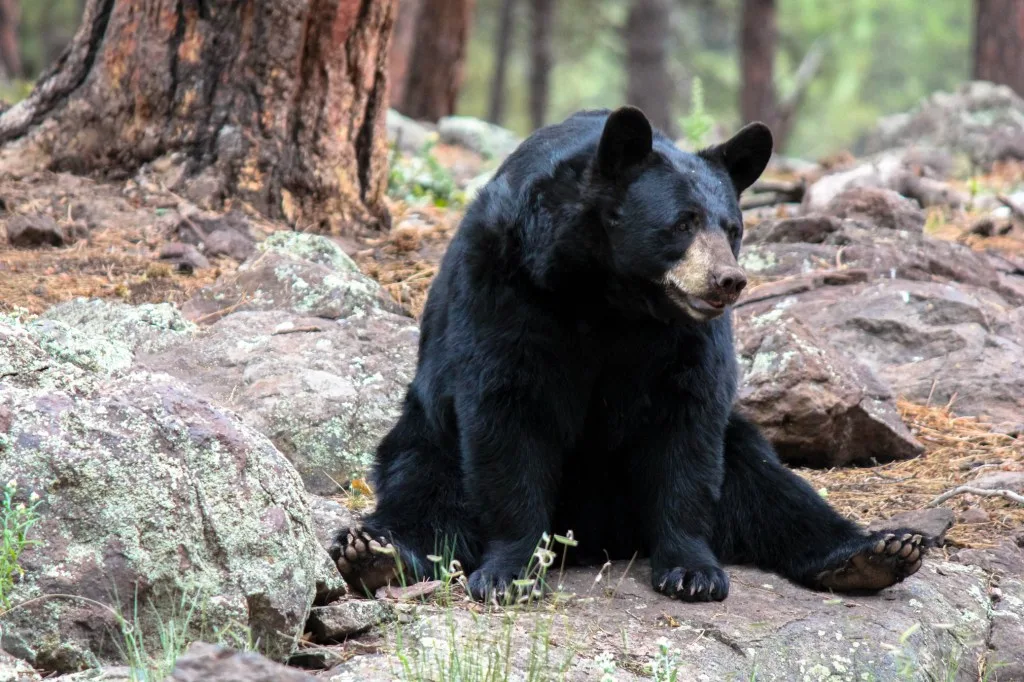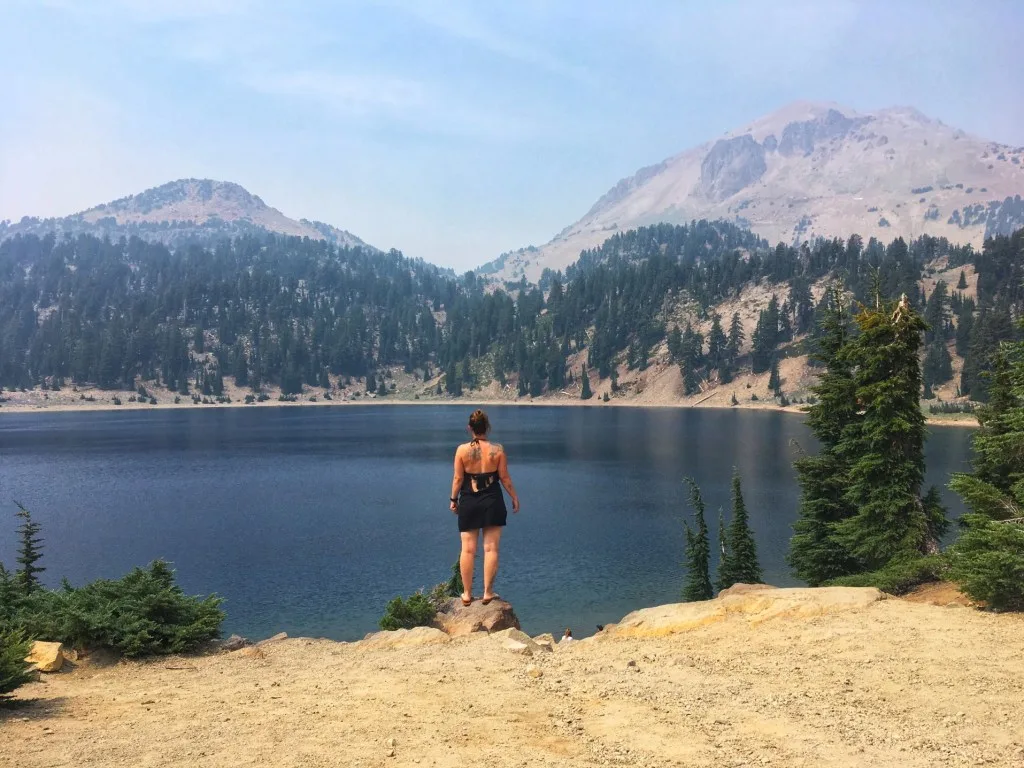You’ll face a certain amount of danger anytime you visit one of the 63 national parks. With miles of paved roads and smooth hiking trails, it’s easy to forget that wildlife called these areas home first. But bear attacks are on the rise in Smoky Mountains.
Recently, a family of five visited Great Smoky Mountain National Park and experienced what happens when black bears get too comfortable with humans. Luckily, the family has a happy ending, but not so much for the bear.
With Great Smoky Mountain National Park seeing an unprecedented number of guests in recent years, bear attacks have become more frequent. Let’s look at what happened and how you can stay safe while camping in the Smokies. Let’s get started.
How Many Bear Attacks Are in the Smoky Mountains?
Bear attacks are rare in the Great Smoky Mountains National Park and the surrounding area. There have only been a handful of known bear attacks in the park. According to the National Park Service, Bill Stiver, a supervisory biologist, states, “There are inherent risks associated with hiking and camping in bear country. Black bears are the largest predator in the park, and although rare, attacks on humans have occurred, inflicting serious injury and death.”
If you plan to visit the Smoky Mountains, you must take a few precautions to protect yourself and your loved ones. Officials often have to relocate or euthanize dangerous wildlife that get too comfortable with humans. You can keep your family and the wildlife safe by taking a few safety precautions.
Pro Tip: Find out What Are The Most Dangerous Creatures in the Smoky Mountains? Will black bears be the most dangerous? Find out!
Are Black Bears in the Smoky Mountains Aggressive?
Black bears aren’t typically an aggressive species. However, much like humans, they tend to get cranky when hungry. Evolution has gifted them with an incredible ability to smell and track down food. They’ll do just about anything to get it.
The behavior of black bears and any other wildlife can be very unpredictable. Animals that are hungry or unhealthy will behave more aggressively, especially during situations that involve food. Adventurers should take every encounter with a black bear seriously and proceed with caution.

What Happened During the Recent Bear Attack in Smoky Mountain National Park?
The most recent bear attack in Great Smoky Mountain National Park involved a family of five and their dog camping in the park’s Elkmont Campground on June 12. The family was asleep in their tent when they awoke at approximately 5:20 a.m. to a bear tearing into their tent. A three-year-old girl and mother both sustained superficial lacerations to their heads.
The bear took off after the father scared it away after multiple attempts. The family immediately received medical care nearby after leaving a note at the campground office regarding the attack. Park officials trapped the bear believed to be responsible.
It appeared bigger than expected for this time of year, meaning it had a steady non-natural food supply. Its food source was likely due to humans not correctly securing their food while camping in the area. Ultimately, officials had to euthanize the bear due to its lack of fear for humans and the attack.
This is another reminder that wildlife can be very dangerous and unpredictable. Those spending time in the area should always store their food correctly and follow proper camping etiquette when camping in areas with a steady bear population.

How Can We Avoid Bears in the Smoky Mountains?
Seeing wildlife while visiting a national park can be exciting and dangerous. You should never approach or attempt to feed bears or any other animals. This typically results in them becoming too comfortable and dependent on humans for food. If you see a bear, keep your distance and do not approach it. Proceed with caution and change directions if necessary.
Most bear encounters occur due to a bear’s curiosity when searching for food. Properly disposing of garbage and food scraps is essential to avoid bears. Campers should always use bear-safe food storage containers when available. It’s a good idea to safely store food and other strong-smelling items away from any areas where you’ll sleep. Bears have a powerful sense of smell and will come to inspect scents.
When hiking, make plenty of noise. Carry on a conversation with other hikers or wear hiking bells when going alone. Bears will likely keep their distance if they hear you coming. The last thing you want to do is surprise a bear that weighs a couple of hundred pounds.
What Should I Do If I See a Bear?
How you respond to a bear encounter will depend on the type of bear. Only black bears live in the Smokies, which typically spook very easily in most human encounters. However, you should avoid running from the bear, which can spark a bear’s natural aggression. Instead, change directions and move slowly. Talk directly, loudly, and forcefully with the bear.
Increase your aggressiveness if the bear shows no signs of backing down from the encounter. If with others, work as a team to make yourselves seem as large as possible. Move to higher ground and pick up nearby tree limbs to appear as large as possible. Throw any non-food items you can at the bear.
Carrying bear spray when hiking is a good idea. However, don’t discharge it too early. You should wait until the bear is within 20 yards of you to spray it. Doing so too early reduces its effectiveness and could be wasteful. If the spray doesn’t work, it may increase the bear’s aggressiveness and intensify the situation.
Pro Tip: Spend the night close to the Smoky Mountains at one of these Best Free Camping Near the Smoky Mountains.

Will a Whistle Scare a Black Bear Away?
While making noise alerts bears of your presence, whistles aren’t typically effective. This is because bears live in an environment with frequent bird noises. What we think is a noisy whistle will likely not surprise a bear. However, a whistle can help others locate you if you become lost or stranded.
What Time of Year Are Bears Most Aggressive?
A majority of bear attacks occur during the spring and summer. During these seasons, bears wake from hibernation, have more limited food sources, and trails become more heavily used. If you plan to hike or spend time in bear country during these months, you must follow bear-safe practices during your adventures. It could make the difference between an exciting and tragic adventure.
How Likely Is It to See a Bear in the Smoky Mountains?
An estimated 1,600 to 2,000 black bears call the Smoky Mountains home. This typically equates to somewhere around one to two bears per square mile. So the odds of seeing a bear while visiting the Smoky Mountains are high, especially when hiking or driving through the park in the early morning hours. Hiking during peak times often reduces your chances as most guests make noise, and bears will keep their distance when possible.
Despite increased bear attacks in recent years, you can have an incredible and safe time in the Smoky Mountains. Take the time to secure food and any other items that might attract bears to you. Avoid camping in soft-sided structures like tents or canvas campers. Follow the guidelines, and you’ll have a safe and exciting time exploring this beautiful area.
Have you been to the Smoky Mountains? Tell us about your experience in the comments!
Discover the Best Free Camping Across the USA
To be honest with you, we hate paying for camping. There are so many free campsites in America (with complete privacy).
You should give it a try!
As a matter of fact, these free campsites are yours. Every time you pay federal taxes, you’re contributing to these lands.
Become a FREE CAMPING INSIDER and join the 100,000 campers that love to score the best site!
We’ll send you the 50 Best Free Campsites in the USA (one per state). Access the list by submitting your email below: